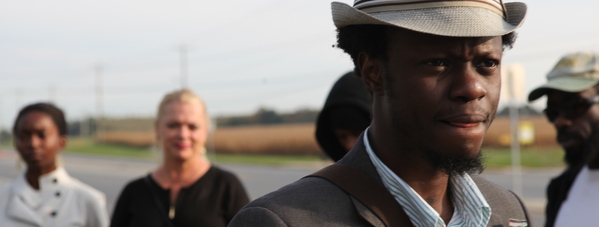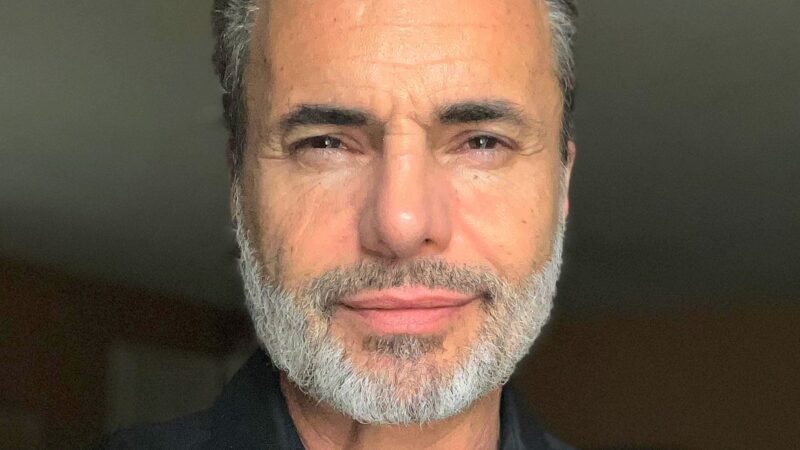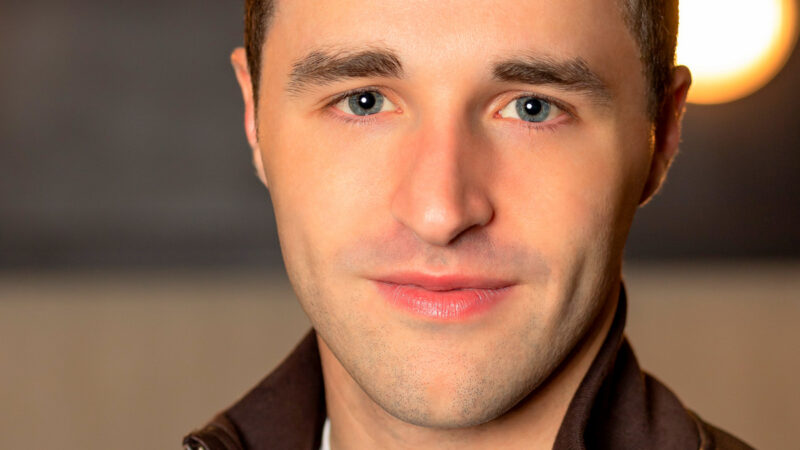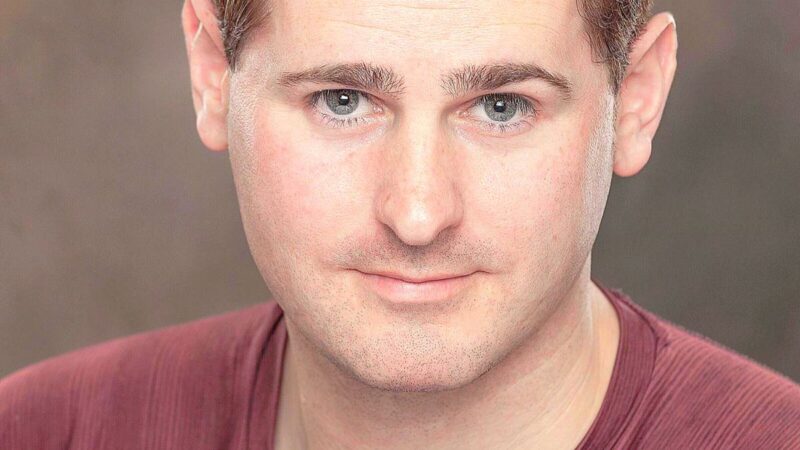
Niyi Towolawi is a British-Nigerian living in London. “I have a B.Sc in Mathematics and an M.Sc in Computer Science, says Niyi. “I was also accepted on the MA filmmaking course at London Film School.” Generally, I have always been creative and played several musical instruments from childhood. I started producing music as a teenager and began shooting music videos in my 20s. I have been a filmmaker for around 12 years now. And, I have written, produced and directed 2 features films, in addition to several shorts, TV commercials, etc.
“As a director, I am very passionate about the material,” says Niyi Towolawi. “I am a storyteller and very hands on with all aspects of the process of how the story unfolds. I strive to get the best performance from my actors. While working with all departments for their contribution to the overall production. Initially, I was very fascinated with the camera. How it moved and having trained as a cinematographer, visual storytelling is something I excel in. I also like to use sound to engage the audience’s imagination.”
Directing is something I happened to slip into. I drew the storyboard for my first music video. However, I ended up directing and editing it myself. It was an award-winning video and having enjoyed the experience so much, I took on other projects. I had always watched films critically since childhood. Then realized I had a lot of skills and the personality synonymous with good directors. I think at the point of embarking on my first feature, I knew I had blossomed as a director.
It’s rather like finding a property or a similar long-term commitment. As a writer, I am constantly thinking up story premises and putting pen to paper. I generally enjoy projects that explore a moral question. Story with interweaving plot-lines and tells the story of an ordinary person in a peculiar but relatable situation. I also like stories about people in diaspora as this is an area under explored on film. Having explored several projects, I eventually commit to the one I find most exciting. By then, plans for the budget, production scale and required resources should already be in place.
I think the biggest mis-conception is that directing is an easy job. When done correctly, the director’s presence on the production is completely invisible. But, when things go wrong, the lack of direction is the first place to lay blame. Even if the flaws are with the script, acting or a production department. Similarly to the manager of football team, the director is in charge and responsible for every aspect of the production. And while the football manager never personally scores a winning goal. It is recognized that their decision-making is a key contributor. The recent events at Manchester United clearly highlights this. As such, the director is typically the only person with a full vision of the production. While everyone else works with a limited view within their role. It is the director that brings all these components together. Then take by take, shot by shot, scene by scene, until the puzzle is fully formed.
I am constantly engaging in sharpening my skills as a director as you always have to be match fit and there’s always room for growth. As a director, one might only average a few days a month on set so it’s important to constantly praise in between. If a boxer or athlete stops training, their time at the top is short-lived. So I watch specific films, outlining them to analyze how specific plot devices help shape the conflict and resolutions. I also read books, blogs and forums. Some of my favorites include www.nofilmschool.com and www.dvxuser.com.
I enjoy reading self-help books that give an insight into behavioral psychology, autobiographies and screenplays. Although I might read a book purely for pleasure, something useful will be retained subconsciously that might spring up in time when I need to be inspired.
It’s important to work with someone who shares your passion, vision and will be committed to the project. Actors have to fit the role they are being cast for, writers need a good understanding on the genre and subject they are working on and producers need a bag of tools to deliver the project within budget, make working conditions relaxed and hopefully exceed expectation. It’s also encouraging if the person can bring something extra to the project such as box office appeal, or other resources to make the project successful.
Once I am committed to a project, it is safe to assume I like the story premise. I also work on the premise that it is a good screenplay even if it isn’t. Also, I would write my own synopsis, treatment and step outline of it, to understand it better. I would do this even for a script that I wrote, treating it like new material. Through this process, I might reorder scenes, combine or introduce new characters; anything I feel will improve the story. My many charts, script notes and other suggestions could then be worked through during the filmmaking process. I also like to do some planning work usually done by an assistant director as a way of preparing myself. Then, I draw in-depth storyboards but not so much anymore, instead scribbling quick shots perspectives. I still do detailed blocking diagrams even before rehearsals or seeing the location, which is then built on. Recently, I started using pre-visualization tools to animate a scene before shoot and this has opened up new possibilities.
In the weeks leading to the production, I usually become very insular, going over the material repeatedly to plan and look for new clues to best tell the story. I typically stop watching films passively, and only consume useful material. I always carry pencils and a notepad with me but I tend to constantly make notes and scribble as fresh ideas constantly pour in. Once the production starts, I tend to become reserved and only focus on shooting the next scene. It is usually very long days on set or planning between them so my precious free time is spent sleeping.
I always believe that the script is just a suggestion for what the story is about. At best, it is a door into the world of the story and often in script analysis, rehearsals or on set, an opportunity presents itself to strengthen the story. On a recent production, I suggested playing a serious negotiation scene as not important, which made the characters appear to be very shrewd with each other.
I think it is important for directors to know what type of story they want to tell, who their audience is and how a project will help their career progression. It is recommended for directors to also write as they can pitch their scripts with themselves attached as director. Otherwise, networking, doing free work, producing their own projects and other activities to demonstrate their ability is useful for a non-established director.
In an ideal world, fund-raising would be someone else’s task. However, today’s filmmakers have to think like end-to-end production companies so exploring all possible venues is recommended. Dipping into ones savings is a popular option, so is reaching out to friends and family to buy into the project. Doing things more professionally, putting together an investment package detailing the return on investment works, while avenues such as crowd funding are becoming powerful tools. It is also advisable to seek pre-sales deals, which not only lead to a distribution route once the film is completed but might pay an advance, which could go towards the production costs.
First of all, commitment and absolute belief in their character. To portray a character well, an actor needs to be able to defend their character even if the character is deeply flawed. They would bring to rehearsal and set, a thorough understanding of who their character is and what they want. Then working with the actor, we can determine the character’s spine as in what the character is about, and how the character’s motive is portrayed through the story. When I first meet an actor, I usually look out for whether they listen, how they respond to direction and how they play off other actors. These are usually good indicators of what the actor is about.
I (Niyi Towolawi) appreciate a producer that understands that my work is demanding and ultimately creative, and is willing to work in a collaborative way and shield the burden where necessary. It is said that the supply line often makes the difference in warfare and similarly, the producer should ensure that provisions are adequately made for the set to run smoothly.
The best way is to write and produce their own films, no matter how simple, short or low/no budget they are. Shooting on a camera phone with friends and family as actors is adequate to demonstrate and hone your skills, and those videos can be shared online to start building an audience.
I have always considered Ridley Scott even though there are dozens of directors that I deeply admire and constantly draw inspiration from. His body of work, style and choices when telling a story are things I have always been drawn to. I think it is important to have someone whose footsteps you would like to follow and if given the same opportunities or in a similar situation as them, you would make the same choices they did. Personally, Ridley Scott does that for me.
They are in an important position and can use their voice to tell stories that have a positive impact on society. I particularly dislike entertainment that enforce negative stereotypes, undermine serious issues or stigmatize underprivileged or certain types of people.
My (Niyi Towolawi) two feature films are Twisted and Turning Point, released in 2007 and 2013 respectively. Twisted was the first Nigerian film to achieve a number of firsts in the UK while Turning Point is a Hollywood/Nollywood collaboration starring a number of big names such as Mama Gee, Jackie Appiah, Oge Okoye and from the Hollywood side Ernie Hudson (Ghost Busters, Oz, The Hand That Rocks The Cradle), KD Aubert (The Scorpion King, Hollywood Homicide, Friday After Next) and Todd Bridges (Diff’rent Strokes).
Niyi Towolawi says, “Both my features casted first time film actors in leading roles, partly to contradict the notion that Nollywood actors are typecasts. This is also something Steven Spielberg is renowned for doing, i.e. casting unknowns in leading roles. I believe my choices have shaped my career and I have been recognized as a pioneer and an international filmmaker.”
Tell us what you think of the interview with Niyi Towolawi. What do you think of it? What ideas did you get? Do you have any suggestions? Or did it help you? Let’s have your comments below and/or on Facebook, Instagram, or Twitter.
Socials
Website
Facebook
Films
YouTube
Twitter
FILMMAKER INTERVIEWS









